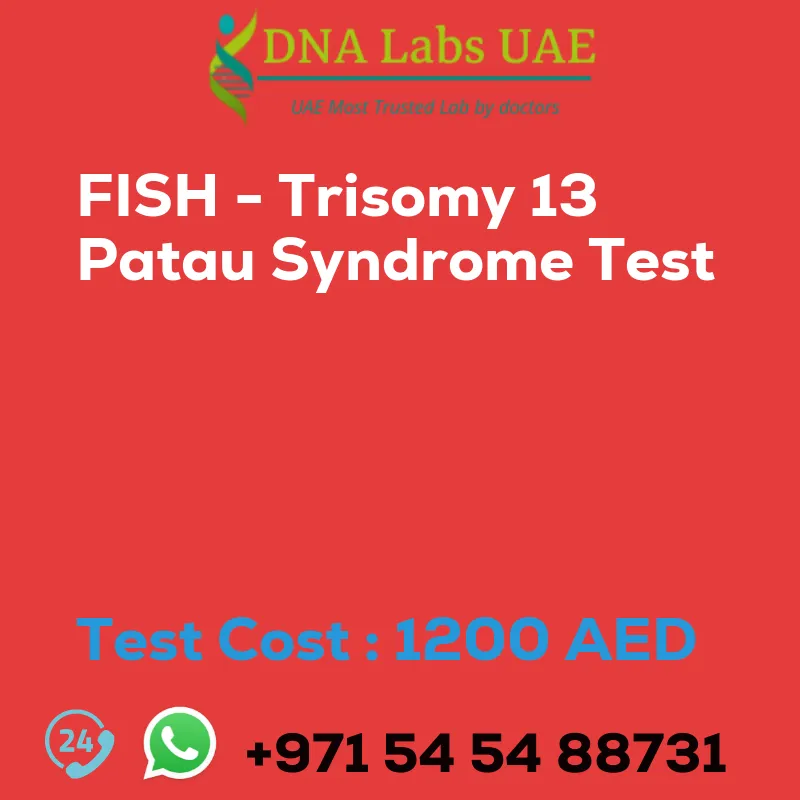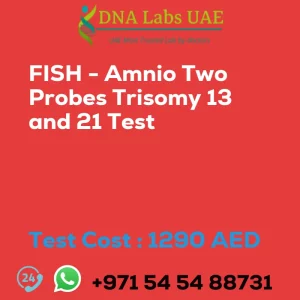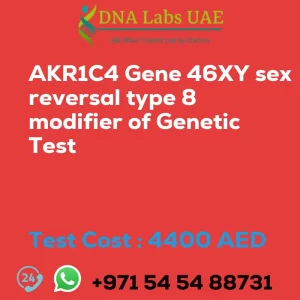FISH – TRISOMY 13 PATAU SYNDROME Test
Test Name: FISH – TRISOMY 13 PATAU SYNDROME Test
Components: Chromosome & FISH analysis Requisition Form (Form 17) & Prenatal Genetic Testing Consent Form (Form 18)
Price: 1200.0 AED
Sample Condition: Normal
Report Delivery: 1 week
Method: FISH (Fluorescence In Situ Hybridization)
Test Type: Gynecology
Doctor: Gynecologist
Test Department: Cytogenetics
Pre Test Information: Duly filled Chromosome & FISH analysis Requisition Form (Form 17) & Prenatal Genetic Testing Consent Form (Form 18) is mandatory.
What is the FISH – TRISOMY 13 PATAU SYNDROME Test?
The Fish – Trisomy 13/Patau Syndrome test is a genetic test used to detect the presence of an extra copy of chromosome 13 in a person’s cells. This condition is known as Trisomy 13 or Patau Syndrome.
How does the test work?
The test uses a technique called Fluorescence In Situ Hybridization (FISH) to visualize the chromosomes in a person’s cells. It specifically targets chromosome 13 and uses fluorescent probes to identify any extra copies of the chromosome.
What are the symptoms and diagnosis?
Trisomy 13/Patau Syndrome is a rare genetic disorder that causes severe developmental abnormalities and is associated with a high risk of infant mortality. Some common features of this syndrome include intellectual disability, cleft lip and palate, heart defects, and various physical abnormalities.
The FISH – Trisomy 13/Patau Syndrome test is usually performed if there are suspected signs or symptoms of the syndrome, such as physical abnormalities detected during prenatal ultrasound or after birth.
Who should consider this test?
The test can also be used for prenatal screening in high-risk pregnancies, such as in older mothers.
Important information about the test
The FISH – Trisomy 13/Patau Syndrome test is not a diagnostic test, but rather a screening tool. If the test results indicate the presence of an extra copy of chromosome 13, further confirmatory testing, such as a chromosomal microarray analysis or a karyotype analysis, may be recommended to confirm the diagnosis.
It is advised to consult with a genetic counselor or healthcare provider for more information about the FISH – Trisomy 13/Patau Syndrome test and its implications.
| Test Name | FISH – TRISOMY 13 PATAU SYNDROME Test |
|---|---|
| Components | |
| Price | 1200.0 AED |
| Sample Condition | |
| Report Delivery | 1 week |
| Method | FISH |
| Test type | Gynecology |
| Doctor | Gynecologist |
| Test Department: | Cytogenetics |
| Pre Test Information | Duly filled Chromosome & FISH analysisRequisition Form (Form 17) &Prenatal Genetic Testing Consent Form (Form 18) is mandatory. |
| Test Details |
The Fish – Trisomy 13/Patau Syndrome test is a genetic test used to detect the presence of an extra copy of chromosome 13 in a person’s cells. This condition is known as Trisomy 13 or Patau Syndrome. The test uses a technique called Fluorescence In Situ Hybridization (FISH) to visualize the chromosomes in a person’s cells. It specifically targets chromosome 13 and uses fluorescent probes to identify any extra copies of the chromosome. Trisomy 13/Patau Syndrome is a rare genetic disorder that causes severe developmental abnormalities and is associated with a high risk of infant mortality. Some common features of this syndrome include intellectual disability, cleft lip and palate, heart defects, and various physical abnormalities. The FISH – Trisomy 13/Patau Syndrome test is usually performed if there are suspected signs or symptoms of the syndrome, such as physical abnormalities detected during prenatal ultrasound or after birth. It can also be used for prenatal screening in high-risk pregnancies, such as in older mothers. It is important to note that the FISH – Trisomy 13/Patau Syndrome test is not a diagnostic test, but rather a screening tool. If the test results indicate the presence of an extra copy of chromosome 13, further confirmatory testing, such as a chromosomal microarray analysis or a karyotype analysis, may be recommended to confirm the diagnosis. It is advised to consult with a genetic counselor or healthcare provider for more information about the FISH – Trisomy 13/Patau Syndrome test and its implications. |








